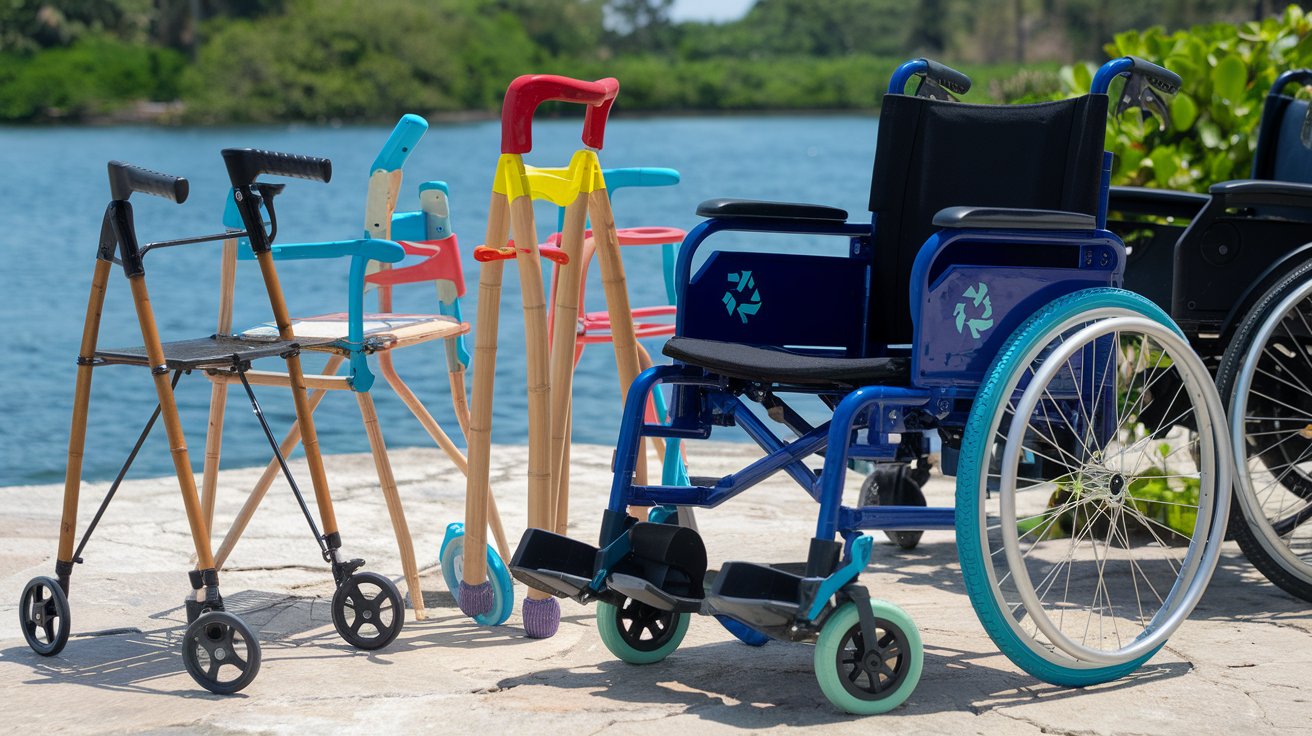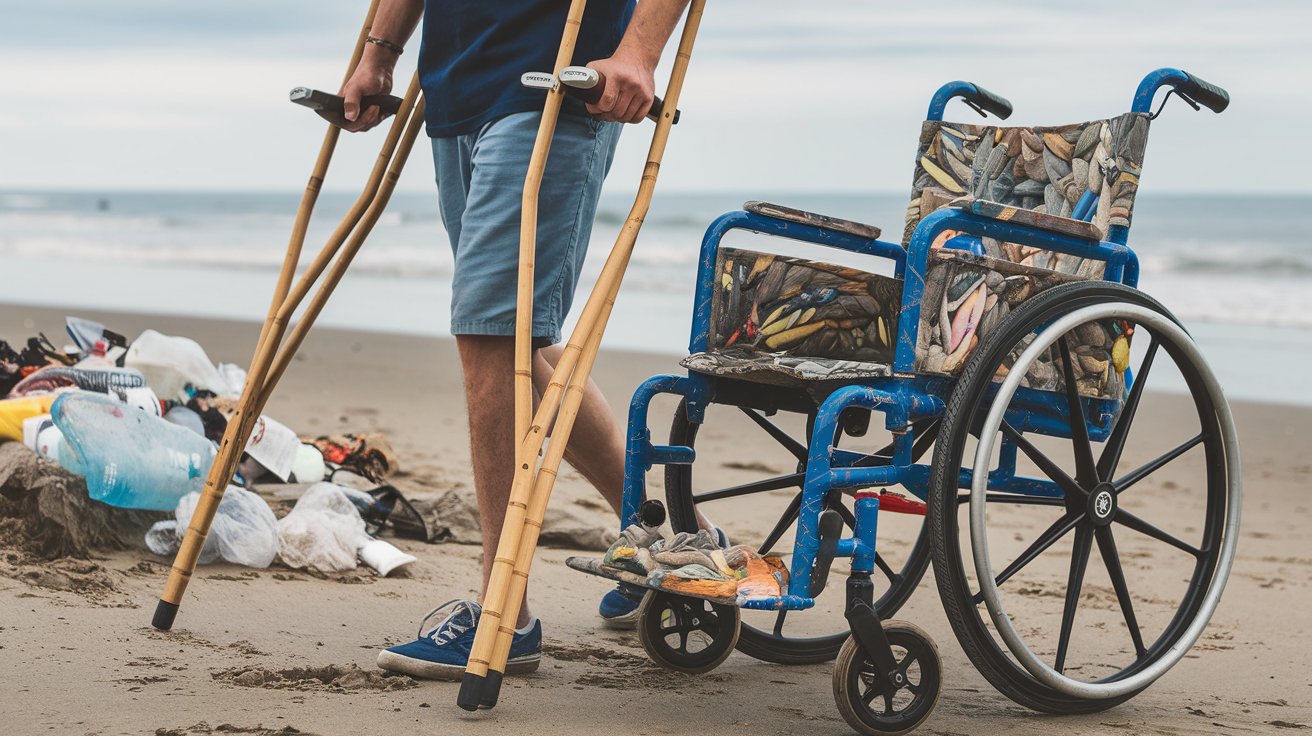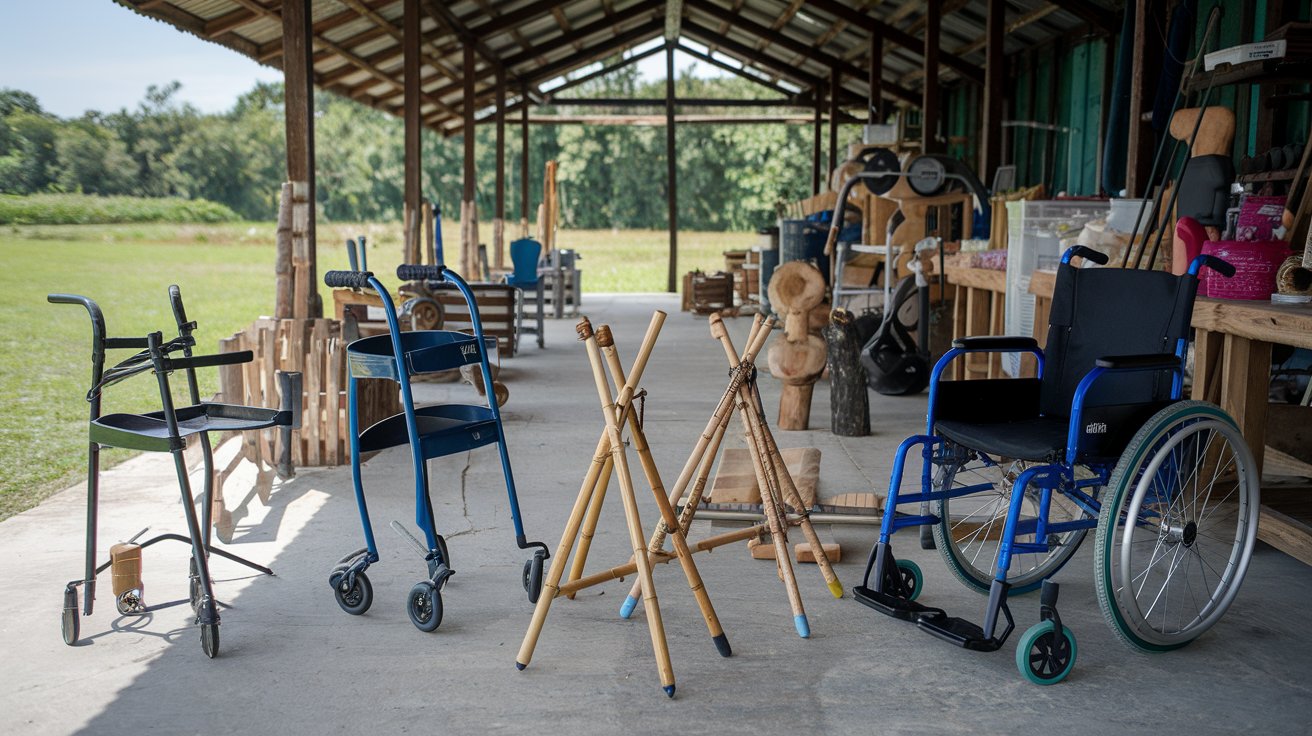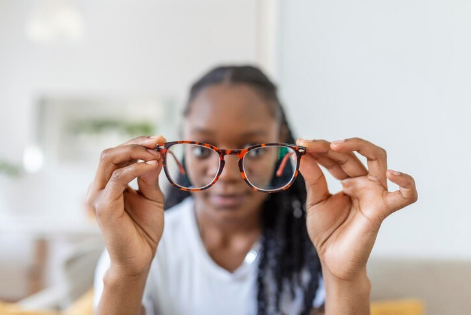Best Mobility Aids For Hip & Knee Injuries[ Expert Advice]

Struggling to move with ease after a hip or knee injury? You’re not alone—these injuries can disrupt even the simplest daily tasks. Whether it’s from a fall, arthritis, or surgery, the pain and instability can leave you searching for solutions.
Here’s the good news: the right mobility aid can be your ultimate recovery partner! But with so many options out there, how do you choose the best one? Stay with us—we’re looking into the top mobility aids that can restore your confidence, ease your pain, and help you get back on your feet faster.
Table of Contents
Types of Mobility Aids for Hip & Knee Injuries
When dealing with hip or knee injuries, the right mobility aid can make all the difference in your recovery journey. Let’s explain the main options, so you can find the one that fits your needs best.
Canes: A Little Extra Support
Canes are perfect if you need just a bit of help with balance or reducing pressure on one side of your body. They’re lightweight, portable, and easy to use. Some even have ergonomic handles to make them more comfortable during long walks.
- Best For: Mild injuries or when recovering strength after surgery.
- Tip: Look for canes with non-slip tips for extra stability.
Walkers: Stability Champions
Walkers are ideal when you need more support than a cane can provide. With four sturdy legs, they offer maximum balance and are great for indoor use. Some walkers even fold, making them convenient to store.
- Best For: Moderate injuries, post-surgery recovery, or anyone with balance issues.
- Tip: Choose one with rubber feet or wheels, depending on your mobility level.
Rollators: Support with Mobility
Rollators are like walkers with wheels—and a touch of luxury! They let you move freely, and most come with built-in seats and storage. Rollators are perfect for outdoor use and longer distances.
- Best For: Moderate to severe injuries, especially for those who still want to stay active.
- Tip: Look for hand brakes for better control on slopes or uneven ground.
Crutches: Temporary Helpers
Crutches are excellent for short-term use when you need to take weight off an injured leg. They provide better maneuverability than walkers or canes but require upper body strength to use effectively.
- Best For: Short-term recovery, like after a sprain or minor surgery.
- Tip: Ensure they’re adjusted to the correct height to avoid strain.
Wheelchairs: Total Support
For more severe injuries or if walking is too painful, wheelchairs are the ultimate support. They provide complete weight relief for your hips and knees, letting you focus on recovery.
- Best For: Severe injuries or long-term recovery needs.
- Tip: Look for lightweight models if you need to transport the wheelchair often.
No matter your injury or level of mobility, there’s a mobility aid out there designed to make life easier and keep you moving!
Factors to Consider When Choosing a Mobility Aid
Choosing the right mobility aid can feel overwhelming, but it doesn’t have to be. Here are a few simple things to think about to make the best choice for your hip or knee recovery:
1. Severity of Your Injury
Is your injury mild, like a sprain, or more severe, like a fracture or surgery?
- For mild support, a cane might be all you need.
- For more serious issues, a walker, rollator, or even crutches may provide the stability and relief you need.
2. Your Strength and Balance
Think about your ability to carry weight and stay balanced.
- If you feel wobbly or weak, a walker with a broad, stable base can help.
- If you’re steady but need occasional support, a rollator with wheels might be better for mobility and convenience.
3. Weight Capacity and Durability
Mobility aids come in different sizes and strengths, so it’s important to pick one that supports your weight comfortably.
- Look for sturdy materials like aluminum or steel for durability.
- Check weight limits to make sure your aid can handle your needs.
4. Comfort and Ergonomics
Your comfort matters!
- Handles with padding or ergonomic designs can reduce strain on your hands and wrists.
- Adjustable aids let you set the perfect height for proper posture and balance.
5. Your Daily Activities
Think about where and how you’ll use your aid.
- Indoors only? A cane or walker may be perfect.
- Outdoors? You might want a rollator with larger wheels for smooth navigation.
Best Mobility Aids for Specific Needs
Choosing the best mobility aid depends on your recovery stage, the severity of your condition, and your overall lifestyle. Here’s a detailed look at how to match the right aid to your needs:
Post-Surgery Recovery: Hip Replacement or Knee Surgery
Recovering from surgery is a delicate process, requiring extra care to avoid putting pressure on healing joints.
- Walkers:
- These are ideal for the early stages of recovery, offering maximum stability.
- Options like two-wheel walkers allow you to move smoothly while keeping weight off your hips or knees.
- Non-wheeled walkers are perfect for those needing a slower pace and more control.
- Rollators:
- These provide support with the bonus of mobility.
- Features like seats and storage baskets make them convenient for indoor and outdoor use.
- They’re best suited for individuals who have regained some strength but still need assistance.
- Crutches:
- Crutches are great for short-term recovery, especially when weight needs to be fully offloaded from one side.
- Look for ergonomic crutches with padded handles and underarm supports to reduce strain.
Arthritis-Related Injuries
Arthritis can cause chronic joint pain, stiffness, and fatigue, making everyday tasks challenging. Choosing lightweight, ergonomic aids can help minimize strain while providing comfort.
- Canes:
- A single-point cane is great for mild to moderate support and can relieve pressure on aching joints.
- Quad canes (with four small feet) provide more stability for individuals with severe arthritis.
- Look for features like cushioned grips and height adjustability for added comfort.
- Rollators:
- Arthritis sufferers often benefit from rollators with large, smooth wheels that glide effortlessly.
- Rollators with built-in seats allow you to rest during longer walks, reducing fatigue.
Sports Injuries
Sports-related injuries like ACL tears, sprains, and fractures often require targeted solutions that are portable, lightweight, and adaptable to an active lifestyle.
- Crutches:
- Ideal for lower-body injuries, crutches can keep weight entirely off the affected limb.
- Adjustable, lightweight models reduce arm fatigue during prolonged use.
- Knee Scooters:
- These are perfect for leg or ankle injuries, offering a wheeled alternative to crutches.
- Knee scooters allow you to rest your injured leg on a padded platform while using your other leg to propel forward.
- Many models come with baskets for added convenience, making them ideal for errands or daily activities.
Chronic Conditions or Limited Mobility
Some individuals require long-term support due to ongoing conditions or limited mobility.
- Wheelchairs:
- A wheelchair may be necessary for those unable to bear weight on their lower body for extended periods.
- Options range from manual to powered wheelchairs, depending on individual strength and mobility.
- Powered Scooters:
- Best for those who need mobility assistance over longer distances.
- Features like easy steering, comfortable seating, and storage options make these aids highly practical.
Temporary vs. Long-Term Needs
- For short-term recovery, crutches, walkers, or knee scooters are typically sufficient.
- For chronic issues or ongoing support, rollators, canes, and wheelchairs are better suited to provide lasting comfort and ease of movement.
Whether you’re recovering from surgery, managing arthritis, or healing from a sports injury, the right mobility aid can make a huge difference. It not only provides physical support but also boosts your confidence and independence. Carefully assess your needs and consult a healthcare professional to make the best choice!
Top Recommended Mobility Aids
Here’s a guide to the best mobility aids tailored to your recovery needs. Whether you need a little extra support or full assistance, we’ve got you covered!
Best Canes for Hip & Knee Support
Canes are perfect for mild to moderate support, helping you take the pressure off your injured joint.
- HurryCane Freedom Edition: Known for its pivoting base, this cane provides excellent stability on uneven surfaces.
- Medline Offset Handle Cane: Lightweight with a cushioned handle, it’s ideal for long-term use.
- Quad Canes: Look for models with a wide base, like the NOVA Quad Cane, for maximum stability and balance.
Most Reliable Walkers and Rollators
Walkers and rollators are fantastic for anyone needing extra balance or support while moving.
- Drive Medical Deluxe Two-Button Walker: A basic, sturdy option for those in early recovery.
- Drive Nitro Euro-Style Rollator: A sleek rollator with large wheels, a built-in seat, and a storage bag—great for indoor and outdoor use.
- OasisSpace Heavy Duty Rollator: Perfect for heavier users, offering durability and comfort with a wide seat and stable frame.
Best Crutches for Temporary Mobility
Crutches are essential for short-term injuries where weight-bearing isn’t an option.
- Ergobaum 7G Forearm Crutches: Designed for comfort with shock absorbers, LED lights, and arm supports.
- Carex Folding Crutches: Compact and lightweight, they’re easy to store and carry.
- Millennial Medical Crutches: These reduce stress on your wrists and shoulders, making them a favorite for long-term users.
Top Wheelchairs for Long-Term Recovery
Wheelchairs are ideal if your injury prevents walking entirely for an extended period.
- Medline Lightweight Transport Chair: Easy to maneuver and transport, perfect for quick trips or indoor use.
- Karman Ergonomic Wheelchair: Offers superior comfort with adjustable armrests and an ergonomic design.
- Drive Medical Silver Sport 2: A budget-friendly option with basic features for everyday use.
Specialized Aids: Knee Scooters
Knee scooters are a lifesaver for leg injuries, offering mobility without the strain of crutches.
- KneeRover Deluxe Steerable Knee Walker: Provides smooth steering and a comfortable knee platform.
- ELENKER All-Terrain Knee Scooter: Perfect for outdoor use, with large wheels for uneven surfaces.
Why These Aids Stand Out
These aids are not just practical but also designed for comfort, durability, and ease of use. They cater to a range of needs, from short-term injuries to chronic conditions, ensuring you can move with confidence and minimal discomfort.
Remember to consult your doctor or physical therapist before making a purchase. Your recovery deserves the best support, and these mobility aids are here to help you every step of the way!
Additional Tools and Accessories to Enhance Recovery
Recovering from hip or knee injuries isn’t just about the main mobility aid—sometimes, the little extras make a big difference! Here are some handy tools to make your recovery more comfortable and convenient:
- Cushions and Pads:
- Add extra comfort to walkers, rollators, or wheelchairs. Look for gel or memory foam cushions that relieve pressure on sore areas.
- Anti-Slip Tips and Wheels:
- For canes, walkers, and crutches, anti-slip tips or rubber grips provide added safety, especially on wet or uneven surfaces.
- All-terrain wheels for rollators or knee scooters make outdoor use smoother and safer.
- Carry Bags and Trays:
- Attachable bags for walkers or rollators let you carry essentials like water bottles, phones, or medications.
- Trays can turn your walker into a portable table for meals or activities.
- Reacher Tools:
- Long-handled grabbers help you pick up items without bending or overreaching—perfect for recovering joints.
When to Consult a Professional
Sometimes, recovery doesn’t go as planned, or you might feel unsure if your mobility aid is the right fit. Here’s when to seek expert advice:
- Persistent Pain or Discomfort:
- If your aid causes new pain in your hands, arms, or back, it might need adjustment.
- Difficulty Using the Aid:
- Struggling to balance or operate your aid could mean you need a different type or additional support.
- Progress is Stalling:
- If you’re not seeing improvement, a physical therapist can guide you on exercises or suggest other aids.
- Signs of Wear and Tear:
- Broken parts, wobbly wheels, or unstable frames are a clear sign it’s time for repair or replacement.
Your doctor or therapist can also teach you the proper techniques to get the most out of your mobility aid and ensure a safer recovery.
FAQs About Mobility Aids for Hip & Knee Injuries
Q: Can I use a mobility aid independently, or do I need help?
- Most mobility aids are designed for independent use, but a professional fitting or training session can help you use them safely and confidently.
Q: How long should I use a mobility aid after an injury?
- It depends on your injury and recovery progress. Minor injuries may require aids for a few weeks, while post-surgery or chronic conditions may need longer-term use.
Q: What’s the difference between a walker and a rollator?
- Walkers are more stable with a solid frame and no wheels (or two small ones). Rollators have four wheels, a seat, and are easier to maneuver, especially for those who can walk but need extra support.
Q: Can I use a knee scooter instead of crutches?
- Absolutely! Knee scooters are a comfortable, hands-free alternative for lower-leg injuries, as long as your doctor approves them for your specific case.
Q: Do mobility aids need regular maintenance?
- Yes, keeping your aid in good condition is crucial. Check for loose screws, worn-out grips, or squeaky wheels regularly, and clean your aid to maintain hygiene.
These tips and answers will help you navigate recovery with confidence, ensuring you choose and use the best mobility aid for your needs!


